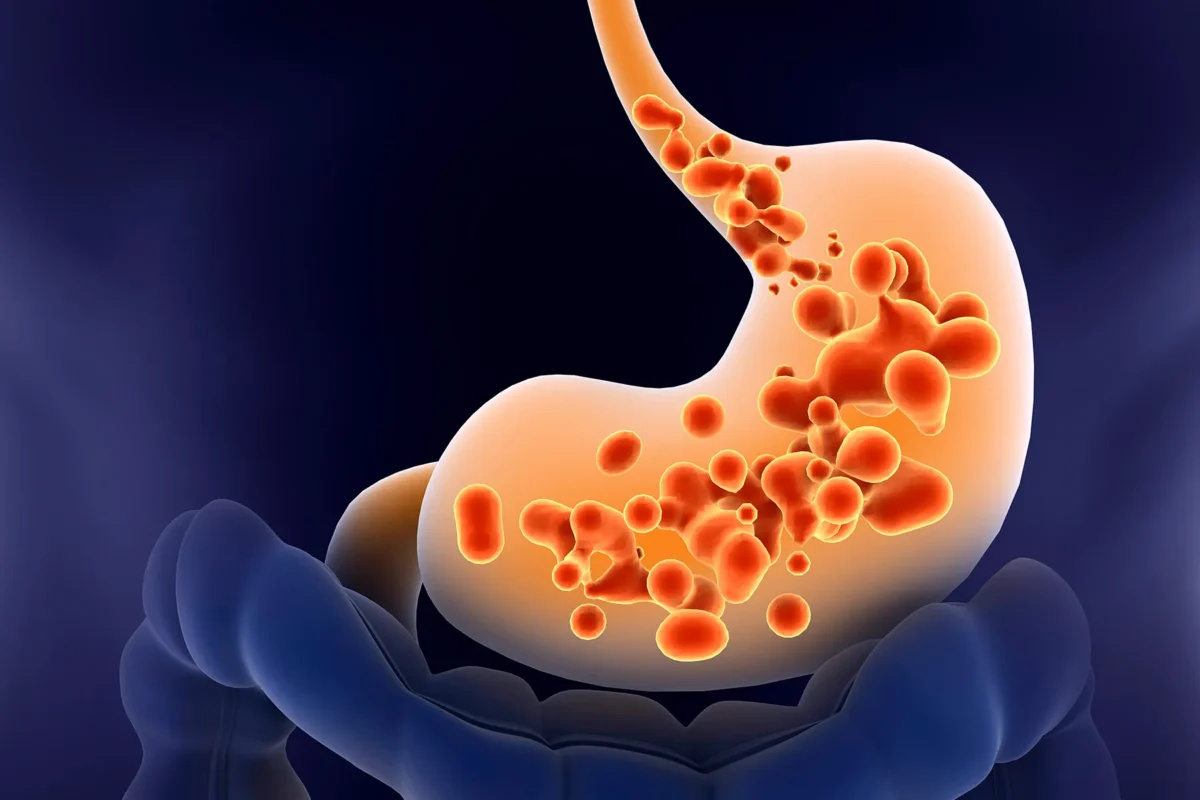Why You Shouldn’t Ignore Persistent Acid Reflux: A Sign of Oesophageal Cancer?

Acid reflux is a common condition that’s often mistaken for occasional heartburn. But when it keeps coming back, it could point to a more serious health concern, like oesophageal cancer.
Knowing the connection between acid reflux and more serious problems can help you catch the warning signs early. If not treated, frequent acid reflux can slowly damage the lining of your oesophagus, increasing the risk of long-term complications, including cancer. Many people live with symptoms like burning in the chest or difficulty swallowing without realising they could be warning signs.
In this blog, we’ll explore how acid reflux can lead to oesophageal cancer, why early attention matters, and what you can do to protect your health.
What Is Acid Reflux?
Acid reflux is a digestive condition where stomach acid flows backwards into the oesophagus, the muscular tube that links the mouth and stomach. This acidic backwards flow irritates the oesophageal lining, often resulting in uncomfortable symptoms.
Common signs of acid reflux include a burning feeling in the chest (heartburn), a sour taste in the mouth, or trouble swallowing. Having these symptoms occasionally is usually nothing to worry about, but if they keep coming back or get worse, it might be GERD—a more serious form of acid reflux.
“Patients often think of heartburn as a trivial issue. But when acid reflux persists, it can damage the oesophagus and evolve into more severe conditions like Barrett’s oesophagus or even cancer,” shared Dr. Deep Goel.
Are Acid Reflux, Heartburn, & GERD the Same Thing?
Before diving deeper, it’s essential to differentiate between acid reflux, heartburn, and GERD (Gastroesophageal Reflux Disease):
- Acid reflux occurs when stomach acid flows backwards into the oesophagus.
- Heartburn refers to the burning pain in the chest that typically results from acid reflux.
- GERD stands for gastroesophageal reflux disease, a more advanced stage of acid reflux that occurs regularly and may need a doctor’s attention.
Understanding these distinctions helps identify when acid reflux is a temporary issue and when it may be an indicator of something more serious.
Symptoms of Persistent Acid Reflux
While occasional acid reflux is normal, especially after heavy meals, specific symptoms indicate a more chronic issue. These include:
- Experiencing heartburn more than twice weekly
- Rising of sour-tasting fluid in the throat
- Difficulty swallowing
- Hoarseness or voice changes
- Chest pain not related to heart issues
Paying attention to these symptoms now can help prevent more significant problems later.
Can Acid Reflux Cause Cancer?
Untreated, long-term acid reflux can contribute to the development of oesophageal cancer. Repeated exposure of the oesophageal lining to stomach acid may trigger a chain of changes in the cells, ultimately leading to a condition known as Barrett’s oesophagus. This condition involves the replacement of normal cells with abnormal, precancerous ones that carry the potential to develop into oesophageal adenocarcinoma—a severe and often aggressive form of cancer.
Although not everyone with acid reflux will face this outcome, individuals with chronic reflux or GERD face a notably increased risk. Early diagnosis, consistent management, and regular monitoring are crucial in reducing this risk and preventing progression to more severe conditions.
“We’ve seen many cases where early endoscopic screening has prevented oesophageal cancer in patients with chronic GERD. Timely diagnosis makes all the difference”, says Dr. Deep Goel.
Long-Term Effects of Acid Reflux
While occasional heartburn may not seem like a big deal, frequent acid reflux can silently cause long-term damage, including:
- Esophagitis: The lining of the food pipe (oesophagus) can get irritated and inflamed, leading to pain and discomfort when you eat or swallow.
- Strictures: Repeated damage can leave behind scar tissue, which narrows the oesophagus, making swallowing difficult or painful.
- Barrett’s Oesophagus: When acid keeps harming the oesophagus, the cells can start to change in a way that may increase the risk of cancer down the road.
- Breathing problems: You might develop ongoing issues like wheezing, a stubborn cough, or a throat that always feels sore or scratchy.
- Higher cancer risk: Over time, repeated damage can raise your chances of developing oesophageal cancer.
In short, untreated acid reflux can damage the throat and lungs, making life uncomfortable and even dangerous over time.
Who Is at Risk?
Several factors increase the likelihood of developing complications from acid reflux:
- Age over 50
- Male gender
- Obesity
- Smoking and alcohol use
- Poor diet
- Family history of GERD or oesophageal cancer
Understanding your risk profile can help you in a proper monitoring and treatment strategy.
One of the patients, Dr Deep, shared, “For years, I ignored my acid reflux, thinking it was just part of ageing. When I finally saw Dr Goel, he discovered I had Barrett’s oesophagus. Thanks to his guidance and treatment, I caught it in time, and I’m healthier than I’ve been in years.”
Another patient also shared, “I used to brush off frequent heartburn as nothing serious. But when it started affecting my voice and sleep, I consulted Dr. Deep Goel. He identified chronic GERD and initiated treatment promptly. His expertise and attention made all the difference—I’m symptom-free and finally at ease.”
Diagnosis and Monitoring
If GERD or Barrett’s oesophagus is suspected, the recommended diagnosis is:
- Endoscopy: A camera-equipped tube to view the oesophagus
- Biopsy: A tissue sample to check for abnormal cells
- pH monitoring: To measure acid levels in the oesophagus
- Barium swallow test: X-rays to examine the digestive tract
These diagnostic tools help determine the severity of the condition and whether cancer is a concern.
Prevention and Management
Taking care of your digestive health doesn’t have to be complicated. Simple lifestyle habits and the right medications can help manage acid reflux and lower the risk of serious conditions like cancer.
Lifestyle Changes
Managing acid reflux starts with simple but effective lifestyle adjustments:
- Eat smaller, more frequent meals
- Avoid spicy, fatty, or acidic foods
- Maintain a healthy weight
- Elevate the head of your bed
- Avoid eating late at night
- Quit smoking and reduce alcohol consumption
Medications
Several over-the-counter and prescription medications can help:
- Antacids: Provide quick, short-term relief
- H2 blockers: Reduce stomach acid production
- Proton pump inhibitors (PPIs): More effective acid reduction for long-term use
When to See a Doctor?
Seek medical attention if:
- You have acid reflux symptoms more than twice a week
- Over-the-counter medications don’t help
- You have difficulty swallowing or unexplained weight loss
- You experience vomiting with blood or black stools
These could be signs of a more serious condition requiring immediate intervention.
Final Thoughts
While occasional acid reflux is common, persistent acid reflux symptoms should never be ignored. GERD can lead to Barrett’s oesophagus and, eventually, oesophageal cancer if left untreated, which is why early diagnosis and proper treatment are so important.
Understanding the long-term effects of acid reflux and its potential to cause cancer empowers you to take control of your health. By recognising the signs early and seeking appropriate care, you can prevent complications and maintain your oesophageal health.
FAQs
1. Is acid reflux more common during pregnancy?
Yes, hormonal changes and pressure from the growing uterus make acid reflux very common during pregnancy, especially in the second and third trimesters.
2. Does sleeping position affect acid reflux?
Yes, lying on your left side can help reduce reflux, while lying flat or on your right side may worsen symptoms. Using a wedge pillow or elevating the head of the bed can also be helpful.
3. Can children or infants have acid reflux?
Yes, babies can have reflux due to their developing digestive systems. Most outgrow it by age one, but frequent vomiting, poor weight gain, or irritability may need a doctor’s attention.
4. Can losing weight reduce acid reflux symptoms?
Weight loss, especially around the abdomen, reduces pressure on the stomach, significantly lowering the chances of acid reflux.
5. Can certain foods trigger acid reflux more than others?
Yes. Spicy foods, citrus fruits, tomatoes, caffeine, chocolate, fatty meals, onions, and carbonated drinks are frequent triggers of acid reflux.
Explore more blogs: Is Your Gut Health in Trouble? Signs You Need a Check-Up?

